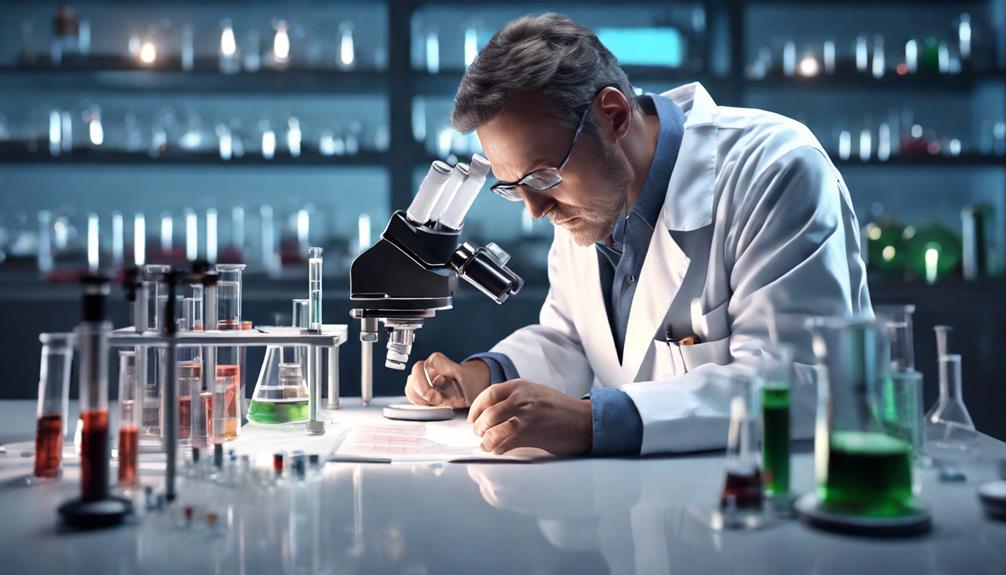Biochemist Job Description
Biochemists analyze living organisms at a molecular level, excel in pharmaceuticals, biotechnology, and environmental research sectors, and utilize advanced tools for data analysis. Responsibilities include conducting experiments, interpreting intricate data, and designing lab experiments. Key skills involve technical proficiency, mastery of lab techniques, and effective project management. A Bachelor's in biochemistry or related field is required, with the potential for higher degrees. Various career paths exist in pharmaceuticals, biotechnology, research institutions, and more. Entry-level salaries start at $45,000 to $60,000. Explore further into the field to uncover career growth and opportunities.
Key Takeaways
- Conduct experiments to elucidate molecular processes in living organisms.
- Analyze biological samples using sophisticated laboratory equipment.
- Interpret complex data sets from experiments for insights.
- Design and execute lab experiments on molecules, cells, and tissues.
- Follow scientific protocols to ensure accuracy and reliability in research.
Overview of Biochemist Role
The biochemist role encompasses the study of living organisms at a molecular level, focusing on the chemical processes and substances that occur within biological systems. In this field, career growth opportunities are abundant, especially with the increasing demand for biochemists in various sectors such as pharmaceuticals, biotechnology, and environmental research. Biochemists play a critical role in conducting industry research to develop new drugs, improve food production, and enhance renewable energy sources.
Proficiency in lab techniques is essential for biochemists, as they are responsible for conducting experiments, analyzing biological samples, and interpreting results. Data analysis skills are also essential, as biochemists need to process and evaluate complex scientific data to draw meaningful conclusions. With advancements in technology, biochemists are increasingly utilizing sophisticated instruments and software for data analysis, making it essential for professionals in this field to stay updated with the latest tools and techniques.
Key Responsibilities of Biochemists
As biochemists explore their research endeavors, their key responsibilities revolve around conducting experiments, analyzing biological samples, and interpreting data to elucidate molecular processes within living organisms. Biochemists employ various research techniques to investigate the chemical and physical principles governing biological processes.
They design and execute lab experiments to study the structure and function of molecules, cells, and tissues. In conducting these experiments, biochemists meticulously follow scientific protocols to guarantee the accuracy and reliability of their findings. Analyzing biological samples using sophisticated equipment and techniques is a pivotal aspect of their work, allowing them to identify and characterize biomolecules.
Additionally, biochemists play an essential role in interpreting complex data sets generated from experiments, drawing meaningful conclusions that contribute to the understanding of biochemical pathways and mechanisms. Their ability to apply analytical skills to decipher biological processes is vital in advancing scientific knowledge and developing innovative solutions in various fields such as medicine, agriculture, and biotechnology.
Essential Skills for Biochemists
Possessing a diverse set of technical skills is essential for biochemists to effectively conduct research and analyze biological systems. Proficiency in various laboratory techniques is paramount for biochemists to carry out experiments accurately and efficiently. Mastery of data analysis is critical for interpreting experimental results and drawing meaningful conclusions from complex datasets.
Furthermore, biochemists must excel in managing research projects, including designing experiments, setting objectives, and adhering to timelines. The ability to collaborate effectively within a team is also essential for biochemists, as research in this field often involves interdisciplinary cooperation. Team collaboration skills enable biochemists to exchange ideas, leverage collective expertise, and achieve research goals collectively.
Education and Training Requirements
Proficiency in specific educational qualifications and training programs is essential for aspiring biochemists to establish a solid foundation in the field. Biochemists typically need a minimum of a bachelor's degree in biochemistry, chemistry, biology, or a related field. However, many positions, especially research-based roles, require a master's or doctoral degree. Degree options range from Bachelor of Science (BSc) to Doctor of Philosophy (PhD) in Biochemistry.
In addition to formal education, gaining hands-on lab experience is vital for biochemists. This experience can be acquired through internships, co-op programs, or research assistant positions during studies. Lab experience not only enhances practical skills but also provides exposure to real-world research scenarios and methodologies.
Career Opportunities for Biochemists
Career opportunities for biochemists encompass a wide array of options across various industries and sectors. In today's job market, biochemists are in high demand due to their expertise in studying chemical processes in living organisms. The pharmaceutical and biotechnology industries are the primary employers of biochemists, offering opportunities in research and development, quality control, and clinical trials. Additionally, biochemists find employment in academic institutions, government agencies, and environmental organizations, where they contribute to scientific research, policy development, and conservation efforts.
Salary expectations for biochemists vary depending on factors such as education, experience, and location. On average, biochemists earn a competitive salary, with entry-level positions starting around $45,000 to $60,000 per year and experienced professionals commanding salaries upwards of $100,000 annually. As industries continue to advance technologically and prioritize research and innovation, the demand for skilled biochemists is expected to remain strong, offering promising career prospects for individuals pursuing this field.
Conclusion
To sum up, biochemists play a vital role in conducting research, analyzing data, and developing new medications and treatments.
With a strong foundation in science and research skills, biochemists are well-equipped to tackle complex challenges in the field of biochemistry.
For example, a biochemist working in a pharmaceutical company may discover a breakthrough drug that revolutionizes the treatment of a certain disease, benefiting countless individuals worldwide.







